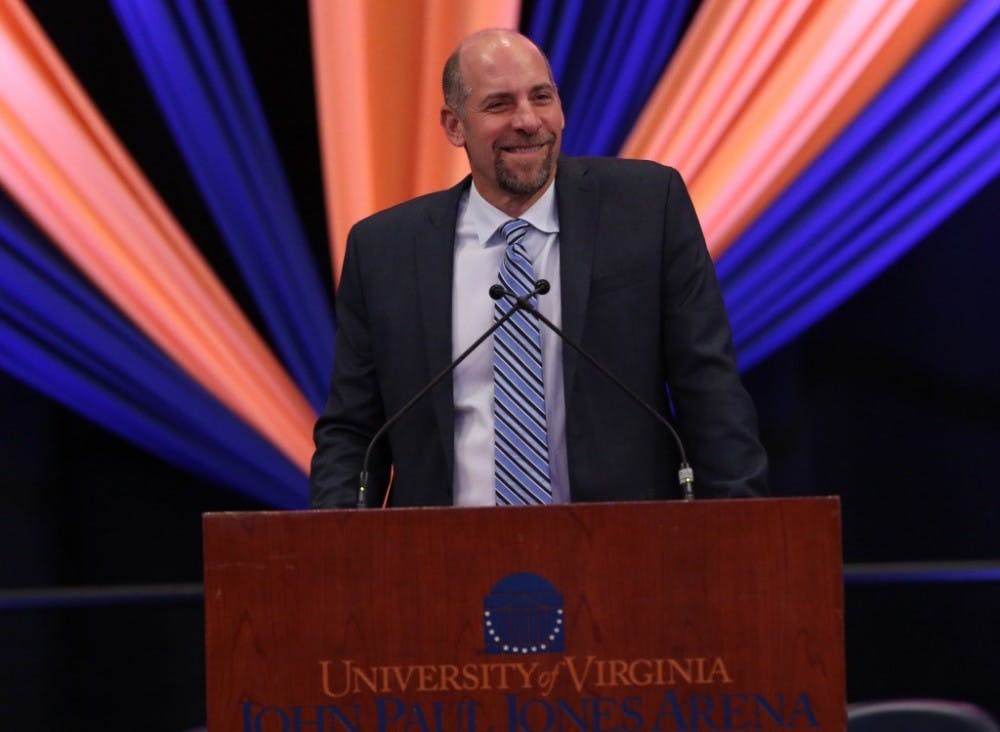As a Hall of Fame former pitcher and current color commentator for Fox Sports, John Smoltz’s career is defined by its successes, not its failures. However, in his recent speech to the Virginia baseball team before the upcoming start to their season, Smoltz emphasized failure and the lessons it can teach, as well as the importance of character above individual success.
“I don’t think people talk enough about failure and what failure can be and how it can motivate because we don’t want to fail … so no one talks about it,” Smoltz said.
Smoltz was in Charlottesville to speak at the Step Up to the Plate gala last Saturday, an annual event in John Paul Jones Arena to kick off the Virginia baseball season. Past speakers at Step Up to the Plate have included Cleveland Indians manager Terry Francona and Hall of Fame ex-players Cal Ripken, Jr., Brooks Robinson, Ryne Sandberg, Ozzie Smith and Dave Winfield.
“I get excited about this event every year,” Virginia baseball Head Coach Brian O’Connor said in a press conference. “How can you not, when you have a basketball arena full of 900 people there to support your program and the players that play in it?”
Though O’Connor has seen many baseball legends speak to his team — having led the Cavaliers since 2004 — he was especially impressed with Smoltz.
“His message to our club was really impactful, talking about how you handle failure,” O’Connor said. “I know our guys will take it well, and hopefully, it helps them continue to improve as individuals and also as a group.”
Last season, Virginia missed the NCAA Tournament for the first time in O’Connor’s 15 seasons. Smoltz’s message could prove especially prescient for this Cavalier team as they look to bounce back from a disappointing fifth place finish in the ACC Coastal Division.
However, Smoltz had words of praise for O’Connor and the Virginia program, including their recently renovated home stadium, Disharoon Park.
“[I’m] very impressed with the baseball stadium,” he said. “This is my first time here. Obviously, I’ve seen the College World Series [which Virginia won in 2015] and the success and the records the coach [O’Connor] has had here.”
Smoltz credited O’Connor with establishing a winning culture that has reflected down on its players.
“[The] level of what is expected here is pretty high. You don’t see that in a lot of baseball programs in college,” Smoltz said. “They’re one of the elite programs and certainly the kids that are here are trying to live up to that and attain that high level.”
Smoltz even compared the Virginia team and its continued success under O’Connor to his own Atlanta Braves, who won 11 straight National League East division titles between 1991 and 2005 under legendary manager Bobby Cox.
“Certainly, when you were part of something like I was, when every year you were supposed to continue to win, and everyone kept wanting to chop us down or give a reason we weren’t [going to be] successful … it’s pretty special,” Smoltz said.
Smoltz emphasized the importance of adjusting after failure, which he himself did in his career with the Braves. He missed the entire 2000 season after undergoing Tommy John surgery and struggled in his return to the starting rotation upon returning.
Cox moved him to the bullpen, making him the Braves’ closer. In his first full season as a reliever, Smoltz went on to set what was then a National League record for saves with 55.
However, Smoltz does not consider this the most impressive rebound from failure of his career, preferring to discuss instead his 1991 season, in which the Braves won the first of their consecutive division titles. Smoltz had won a respectable 14 games the prior year on a last-place Braves team.
“I was coming off a great year a year before on a team that lost almost 100 games,” Smoltz said.
Smoltz opened the 1991 season with a 2-11 record on a team that started the season 39-40 and was on course to miss the playoffs midway through the year.
“The great manager, the Hall-of-Fame manager, Bobby Cox stuck with me. I knew I couldn’t have stayed at that rate in the rotation, but I turned it around,” he said.
The Braves won 55 of their last 83 games that year to sneak into the playoffs then continued their momentum on to the World Series, where they lost in seven games to the Minnesota Twins.
For his part, Smoltz finished the season 12-2, pitching the final game of the regular season, Game 7 of the National League Championship against the Pittsburgh Pirates and Game 7 of the World Series against Minnesota.
“When you overcome something like that, you feel like you can overcome anything,” Smoltz said.
However, as a player whose career overlapped almost completely with baseball’s steroid era when records were shattered by juiced-up stars, he also made sure to note that an athlete’s character is more important than their success.
“Baseball had a big cloud over it when I played,” Smoltz said. “I’m most proud of the fact that I didn’t fall prey or victim to any of those temptations that were going to taint my character.”
As the Cavaliers prepare to play their first game on Feb. 15, O’Connor and the Cavaliers look to take Smoltz’s’ lessons to heart.
“We all love to win and we’re going to win and we’re going to be proud of winning but we’re going to win the right way,” O’Connor said.







